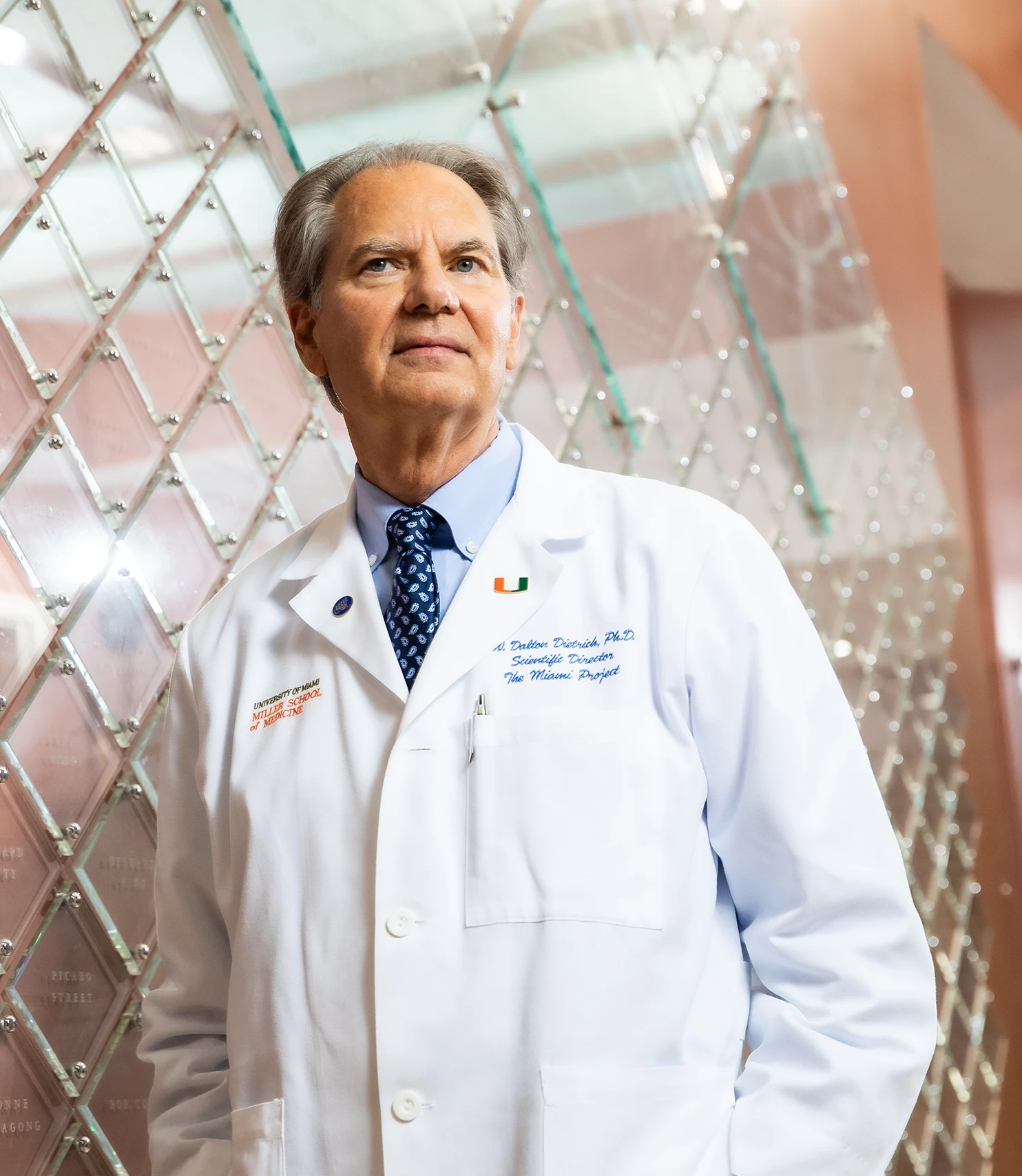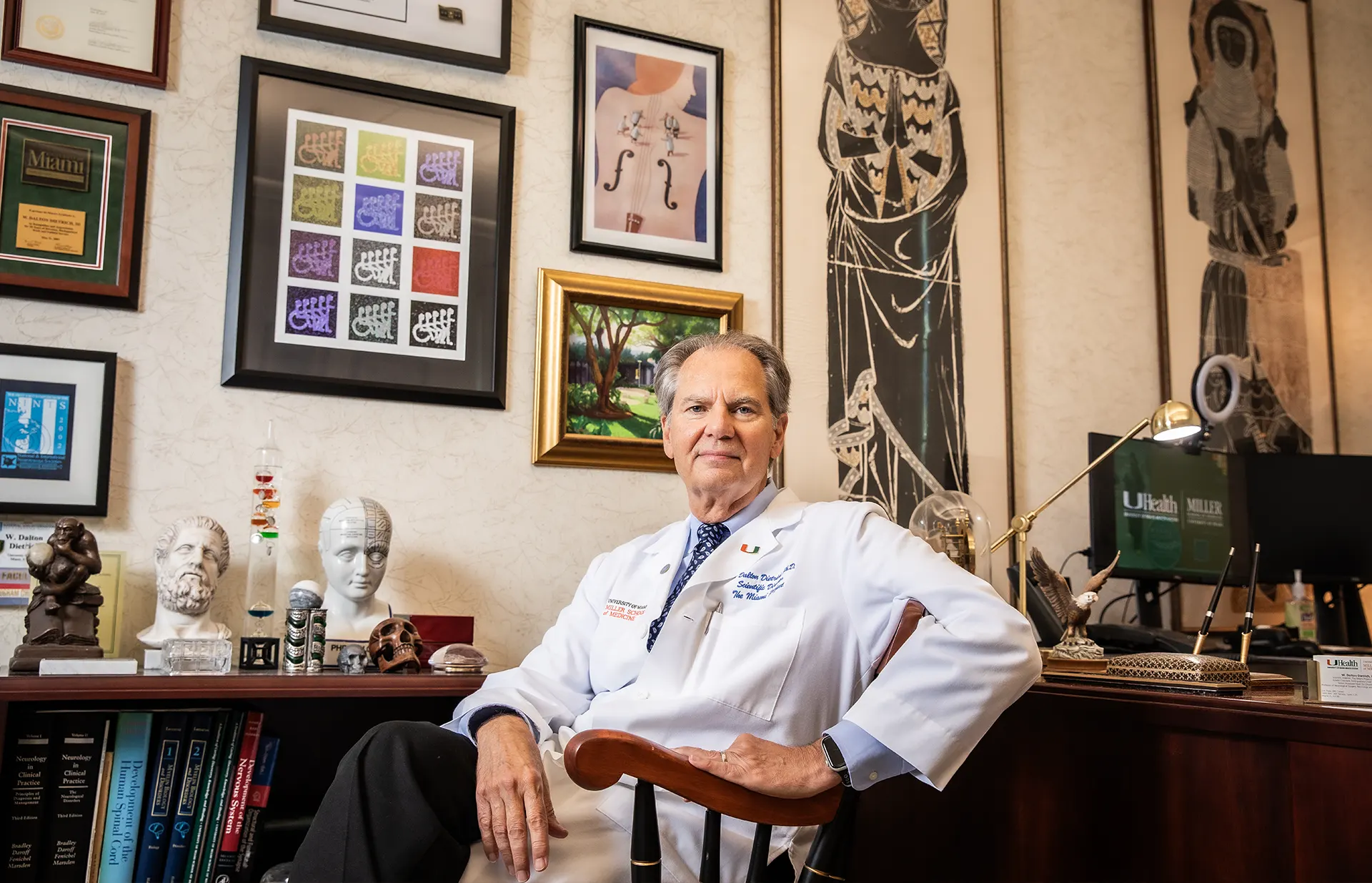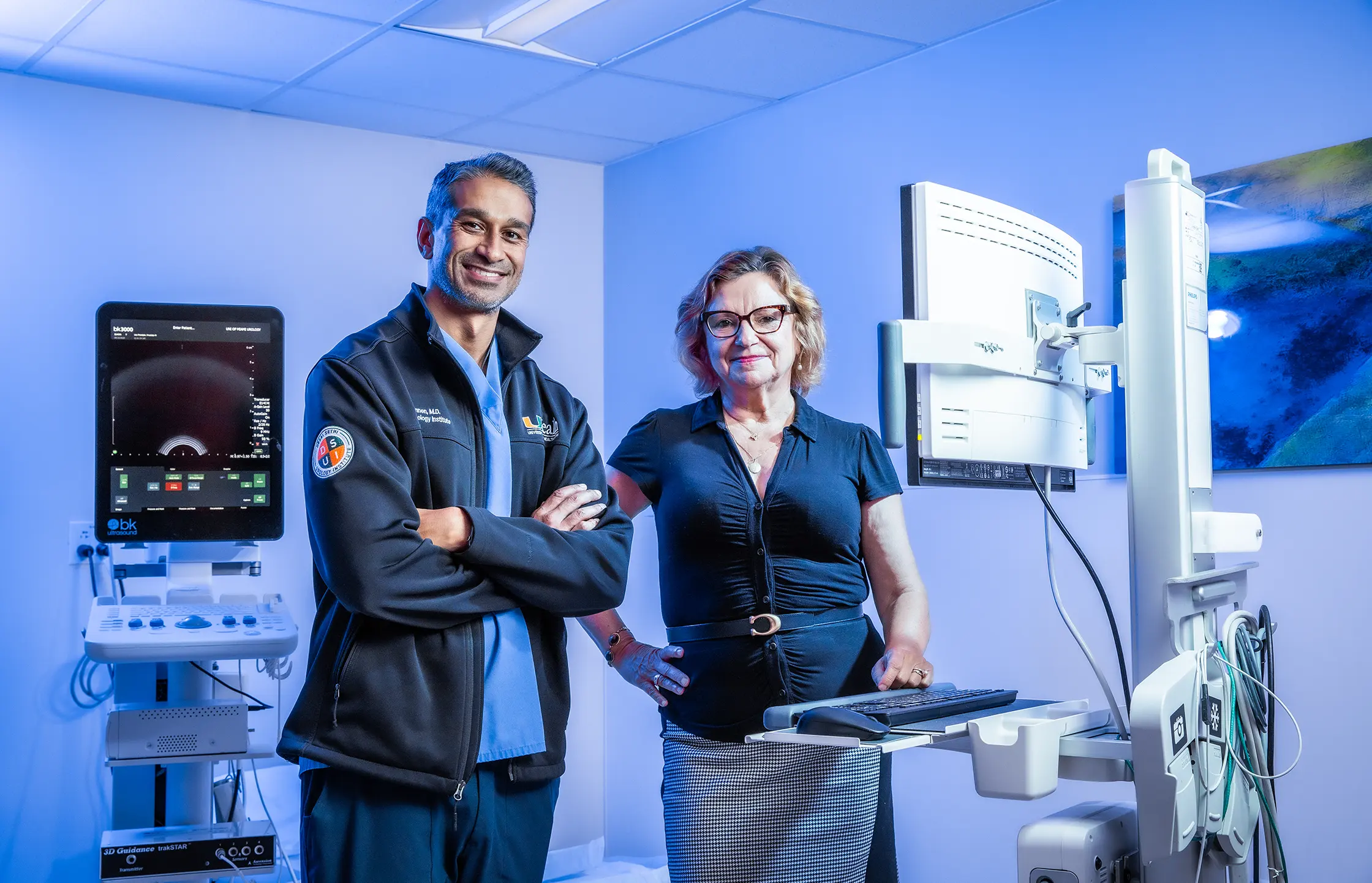Neurotrauma Research and the Quest for a Cure
A multidisciplinary team approach is testing new ways to protect and restore function after brain and spinal cord injury
Traumatic brain injury (TBI) and spinal cord injury (SCI) – neurotrauma – continue to be major public health problems throughout the world. Each day in Miami, patients arrive at UM/Jackson Memorial Hospital’s Ryder Trauma Center with serious head, spinal cord or peripheral nerve injuries.
The trauma team responds rapidly with the best surgical, pharmacological and other medical interventions to save lives and improve long-term outcomes. From there, severely injured patients often enter the neurological intensive care unit eventually moving on to physical therapy and other rehabilitation regimens to support their recovery.
“During this critical period, investigative research is conducted to help develop new diagnostic and treatment approaches to improve outcomes,” said Allan Levi, M.D., Ph.D., chair of the Department of Neurological Surgery.
Although intensive therapies can help injured patients, and limit secondary complications, people with moderate-to-severe injuries commonly face long-term functional losses and other quality-of-life issues. One major barrier is a lack of proven therapies to protect injured tissues and promote reparative mechanisms that could restore function. The scientific team at The Miami Project to Cure Paralysis, a Center of Excellence at the Miller School, is working with colleagues throughout the university to fill that gap.
“We are combining basic, translational and clinical work to develop new therapeutic interventions to protect and repair the nervous system,” said W. Dalton Dietrich, Ph.D., scientific director of The Miami Project. “In the laboratories of the Lois Pope LIFE Center and the Christine E. Lynn Rehabilitation Center, dedicated researchers are developing and testing innovative approaches to restore function after neural injury.”
One group is evaluating a new generation of drug candidates to regenerate neural tissue after injury. Miami Project researchers have identified a series of compounds that strongly induce the growth of axons, which connect neurons to foster communication within the nervous system. This work has demonstrated significant axonal regeneration and improved motor function after SCI.
“The program brings together leading experts in drug development, medicinal chemistry, preclinical animal research, clinical trial design and FDA regulatory processes, all working together to translate our basic research discoveries with the potential to revolutionize SCI care,” said Hassan Ali, Ph.D., M.S.M., associate professor of neurological surgery and medicine and principal investigator on the grant funding this work.
Neurotrauma Research

Multidisciplinary investigators are also working to reprogram cell communication systems to help protect and heal damaged tissue. They are targeting extracellular vesicles, including exosomes, which are small, bubble-like vesicles that many cells release to promote intracellular communication.
Cell-derived exosomes contain proteins, lipids and genetic materials that can be transferred from one cell to another, driving both normal and abnormal cell function. “Injured brain cells release exosomes that may transport cargos that generate harmful inflammation and additional injuries in adjacent cells and remote organ systems,” said Nadine Kerr, Ph.D., assistant professor of neurological surgery.
Scientists are also discovering that delivering exosomes from healthy cells is a minimally invasive way to provide therapeutic cargos to injured tissues. “The potential for systemically delivering human cell-derived exosomes carrying a cargo that may protect and repair cells or organ systems at risk is an exciting new direction,” Dr. Dietrich said.
One of the unique characteristics of The Miami Project is the colocalization of a basic and translational research program in an acute rehabilitation hospital. This revolutionizes the way basic research findings are translated to the clinical setting and the reverse translation of clinical questions back to research laboratories. This setting also facilitates close collaboration with the South Florida SCI Model System, co-led by TMP researchers Elizabeth Felix, Ph.D., professor, Mark Nash, Ph.D., professor, and Leslie Morse, D.O., chair, all from the Department of Physical Medicine and Rehabilitation.

W. Dalton Dietrich, Ph.D.
Recent studies have emphasized the potential benefits of activating residual neural circuits to improve function in people living with brain or SCI. Several lines of research have revealed that people with chronic SCI have a previously unknown capability for recovery. Scientists are combining neuromodulation with brain-computer interfaces to bypass injured parts of the spinal cord and enhance therapeutic efficacy and functional recovery. “Research has revealed new closed-loop stimulation strategies that, combined with directed rehabilitation, can dramatically improve motor function for people with brain and SCI,” said Matija Milosevic, Ph.D., assistant professor of neurological surgery.
Working with industry partners, Miami Project investigators are also using magnetic or electrical signals to stimulate neural circuits. These approaches, combined with motor rehabilitation, can generate improved function. In a large, multicenter trial, UM researchers tested a new transcutaneous spinal cord stimulation protocol (the Up-LIFT study) to improve upper extremity function in patients suffering from chronic SCI.
This 14-center team science investigation included Dr. Morse and James Guest, M.D., Ph.D. ’97, professor of neurological surgery, as co-principal investigators. “The study demonstrated the benefits of this neuromodulation approach on upper-limb function,” Dr. Guest said. “This is an important quality-of-life issue for individuals living with paralysis.”
“Taken together, these multidisciplinary investigations are producing scientific breakthroughs that are providing new hope for people living with acute and more progressive neurological disorders,” Dr. Dietrich said.
University of Miami Medicine
FALL 2024













